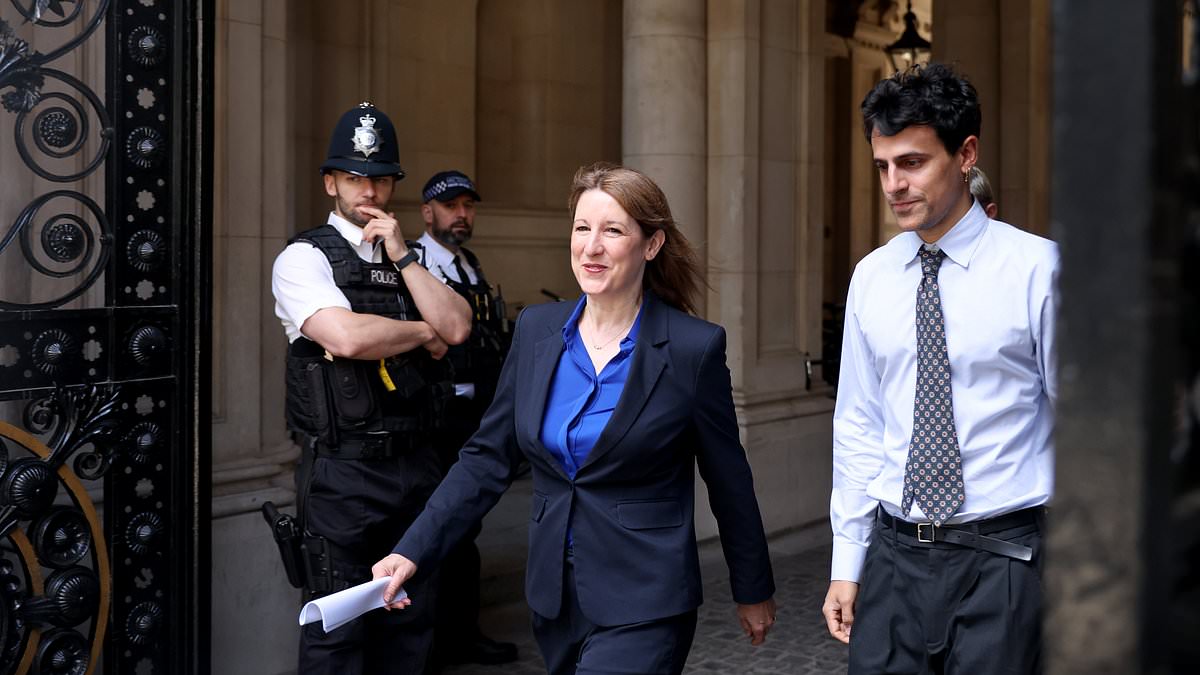The Treasury watchdog has sounded an alert on the prospect of wealth taxes, warning that Labour cannot rely on small numbers of ‘mobile’ rich people.
The OBR highlighted the ‘risks’ of trying to milk too much from ‘high net worth’ individuals as it painted a grim picture of the government’s long-term finances.
The books have been left in a ‘vulnerable’ position after Covid and energy price spikes that could prevent ministers responding to future economic shocks, according to the latest fiscal sustainability report.
That has been exacerbated by U-turns on curbing disability benefits spending and the winter fuel allowance, as well as pressure to ramp up defence.
Meanwhile, the backdrop of an aging population, with state pension costs set to spike, means government debt could spiral to 270 per cent of GDP by the 2070s – or even higher in a worst-case scenario.
Climate change also poses a major long-term threat, partly because the government has not managed to identify a way of replacing revenues from fossil fuel duties.
Senior Labour figures have been urging Rachel Reeves to impose a new ‘wealth tax’ as she scrambles to fill an estimated £30billion black hole in the books at the Autumn Budget. Ministers have repeated refused to rule out the idea in recent days, despite the Chancellor previously saying she was ‘not interested’ in it.
But the OBR report said it had previously raised concerns about the ‘narrowing of tax bases’ where revenues were ‘reliant on a smaller group of taxpayers’.
‘The changes focused on high-net-worth individuals include the reforms to the non-domicile regime in the March and October 2024 Budgets, which were estimated to boost receipts by a peak of £13.1 billion in 2027-28, mostly from a population of under 10,000 individuals,’ the report said.
‘In addition, changes to capital gains tax at the October 2024 Budget were forecast to increase revenues by £2.5billion in 2029-30, with a majority of the revenue coming from the under 6,000 taxpayers making gains larger than £2million each year.
‘Higher earners’ behavioural responses to tax changes are more uncertain and potentially higher than assumed in costings.
A growing reliance on this small and mobile group of taxpayers therefore represents a fiscal risk.’
The report said that although longer-term departmental budgets might help stability, there were ‘new risks’ from ‘unfunded policy announcements’.
Those included Keir Starmer signing up to a new Nato target for spending 3.5 per cent of GDP on defence by 2035. The government has not said how the move will be funded.
‘Policy announcements such as the recent announcements on increasing defence spending by 2035, reversing planned cuts in winter fuel payments, and scaling back planned welfare reforms, present new downside risks to the fiscal position,’ the report said.
The OBR pointed out that the tax burden is already on track to hit a record high.
It underscored the impact of the long-running personal tax threshold freezes – which are due to end in 2028, but have been the subject of renewed speculation about an extension.
The existing freeze is predicted to drag 4.2million additional taxpayers into income tax by 2028-29, shift 3.5million taxpayers into the 40p higher rate, and 600,000 into the top rate.
The report said: ‘Efforts to put the UK’s public finances on a more sustainable footing have met with only limited and temporary success in recent years in the aftermath of the shocks, debt has also continued to rise and borrowing remained elevated because governments have reversed plans to consolidate the public finances.
‘Planned tax rises have been reversed, and, more significantly, planned spending reductions have been abandoned.’
UK public sector debt stood at 96.4 per cent of GDP in May, according to latest figures from the Office for National Statistics.
The OBR said its annual fiscal risks and sustainability report that debt is projected to be ‘above 270% of GDP by the early 2070s’.
The forecaster added that recent rises in debts have led to ‘a substantial erosion of the UK’s capacity to respond to future shocks and growing pressures on the public finances’.
Another major risk highlighted was potential cyber attacks, in light of recent assaults on the Legal Aid Agency, HMRC and Marks & Spencer.
The watchdog predicted that a cyberattack on critical national infrastructure has the potential to temporarily increase borrowing by 1.1 per cent of GDP.
Climate change also ‘poses significant risks to economic and fiscal outcomes in the UK’.
There is ‘an increasing likelihood of more severe impacts of climate change on economies’, the OBR said, as the latest analysis now accounted for ‘the impacts of higher precipitation and temperature variability’.
As a result, the OBR has updated its estimates for the economic damage caused by climate change in both its best case scenario – 2C of warming – and its worst case, an increase of 3C.
GDP could be reduced by 3.3 per cent by 2060 in the event of 2C warming, the watchdog said, and 7.8 per cent by 2060 in the 3C scenario.
